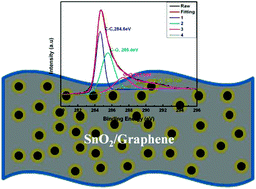Study on SnO2/graphene composites with superior electrochemical performance for lithium-ion batteries†
Abstract
In this study, the in situ growth of tin dioxide (SnO2) nanoparticles on reduced graphene oxide (rGO) has been realized using a hydrothermal method. The size of the SnO2 nanoparticles in the SnO2/rGO composites prepared by three different procedures is about 5 nm, and they are well dispersed on rGO. When applied as anode materials for lithium-ion batteries, we found that the composites synthesized from the stannous oxalate precursor showed the best rate performance and highest cyclic stability. The surface status of the composites, including interactions between SnO2 and rGO and surface chemical components, was investigated in detail in order to understand why the composites prepared using different procedures displayed vastly different electrochemical performances. The results presented here describe a new approach for the synthesis of uniform and nanosized metal-oxide/rGO composites with excellent electrochemical performance.


 Please wait while we load your content...
Please wait while we load your content...